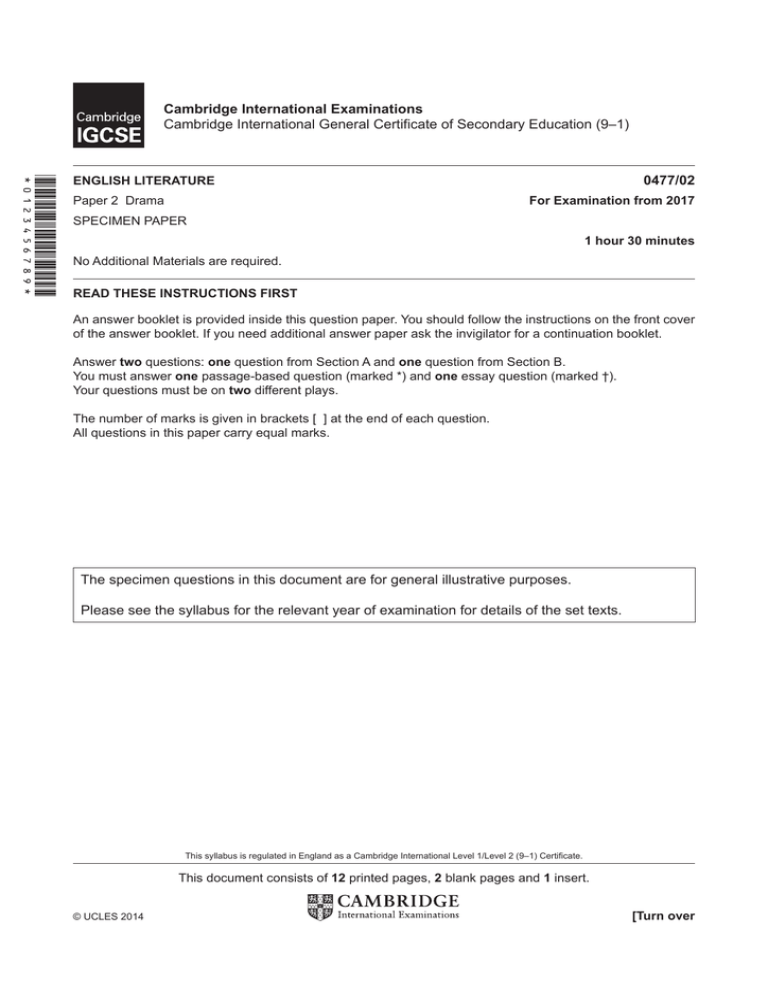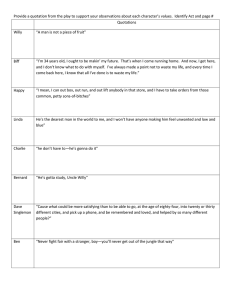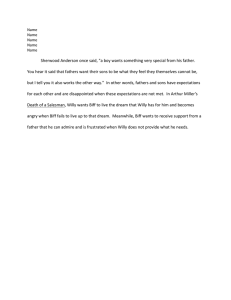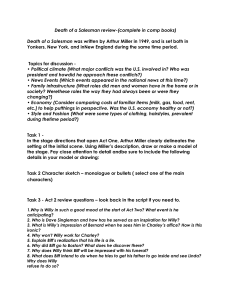
Cambridge International Examinations
Cambridge International General Certificate of Secondary Education (9–1)
*0123456789*
0477/02
ENGLISH LITERATURE
Paper 2 Drama
For Examination from 2017
SPECIMEN PAPER
1 hour 30 minutes
No Additional Materials are required.
READ THESE INSTRUCTIONS FIRST
An answer booklet is provided inside this question paper. You should follow the instructions on the front cover
of the answer booklet. If you need additional answer paper ask the invigilator for a continuation booklet.
Answer two questions: one question from Section A and one question from Section B.
You must answer one passage-based question (marked *) and one essay question (marked †).
Your questions must be on two different plays.
The number of marks is given in brackets [ ] at the end of each question.
All questions in this paper carry equal marks.
The specimen questions in this document are for general illustrative purposes.
Please see the syllabus for the relevant year of examination for details of the set texts.
This syllabus is regulated in England as a Cambridge International Level 1/Level 2 (9–1) Certificate.
ThisThis
document
document
consists
consists
of 12
ofprinted
xx printed
pages,
pages
2 blank
and xx
pages
blank
and
pages.
1 insert.
© UCLES 2014
2013
[Turn over
2
BLANK PAGE
© UCLES 2014
0477/02/SP/17
3
CONTENTS
SECTION A: SHAKESPEARE
Text
Question
numbers
Page(s)
William Shakespeare: Much Ado About Nothing
*1, †2
pages 4–5
William Shakespeare: Romeo and Juliet
*3, †4
pages 6–7
SECTION B: DRAMA
Text
Question
numbers
Page(s)
Brian Clark: Whose Life is it Anyway?
*5, †6
pages 8–9
Arthur Miller: Death of a Salesman
*7, †8
pages 10–11
R. C. Sherriff: Journey’s End
*9, †10
pages 12–13
The specimen questions in this document are for general illustrative purposes.
Please see the syllabus for the relevant year of examination for details of the set texts.
* passage-based question
† essay question
© UCLES 2014
0477/02/SP/17
[Turn over
4
SECTION A: SHAKESPEARE
Answer one question from this section.
WILLIAM SHAKESPEARE: Much Ado About Nothing
Remember to support your ideas with details from the text.
Either
*1
Read this extract, and then answer the question that follows it:
Leonato:
Don John:
Benedick:
Hero:
Claudio:
Are these things spoken, or do I but dream?
Sir, they are spoken, and these things are true.
This looks not like a nuptial.
True! O God!
Leonato, stand I here?
Is this the Prince? Is this the Prince’s brother?
Is this face Hero’s? Are our eyes our own?
Leonato:
All this is so; but what of this, my lord?
Claudio:
Let me but move one question to your daughter;
And, by that fatherly and kindly power
That you have in her, bid her answer truly.
Leonato:
I charge thee do so, as thou art my child.
Hero:
O, God defend me! how am I beset!
What kind of catechising call you this?
Claudio:
To make you answer truly to your name.
Hero:
Is it not Hero? Who can blot that name
With any just reproach?
Claudio:
Marry, that can Hero;
Hero itself can blot out Hero’s virtue.
What man was he talk’d with you yester-night
Out at your window, betwixt twelve and one?
Now, if you are a maid, answer to this.
Hero:
I talk’d with no man at that hour, my lord.
Don Pedro: Why, then are you no maiden. Leonato,
I am sorry you must hear: upon mine honour,
Myself, my brother, and this grieved Count,
Did see her, hear her, at that hour last night,
Talk with a ruffian at her chamber window;
Who hath, indeed, most like a liberal villain,
Confess’d the vile encounters they have had
A thousand times in secret.
Don John: Fie, fie! they are not to be nam’d, my lord,
Not to be spoke of;
There is not chastity enough in language
Without offence to utter them. Thus, pretty lady,
I am sorry for thy much misgovernment.
Claudio:
O Hero, what a Hero hadst thou been,
If half thy outward graces had been placed
About thy thoughts and counsels of thy heart!
But fare thee well, most foul, most fair! Farewell,
Thou pure impiety and impious purity!
For thee I’ll lock up all the gates of love,
And on my eyelids shall conjecture hang,
To turn all beauty into thoughts of harm,
And never shall it more be gracious.
© UCLES 2014
0477/02/SP/17
5
10
15
20
25
30
35
40
45
5
Leonato:
Beatrice:
Don John:
Benedick:
Beatrice:
Hath no man’s dagger here a point for me?
[Hero swoons.
Why, how now, cousin! Wherefore sink you down?
Come, let us go. These things, come thus to light,
Smother her spirits up.
[Exeunt Don Pedro, Don John, and Claudio.
How doth the lady?
Dead, I think. Help, uncle!
50
[from Act 4 Scene 1]
How does Shakespeare’s writing make this such a dramatic and significant moment?
Support your answer with details from the extract and your wider knowledge of the play.
[25]
Or
†2
Do you think that Shakespeare portrays Beatrice as a wholly admirable character?
Support your answer with details from the play.
© UCLES 2014
0477/02/SP/17
[25]
[Turn over
6
WILLIAM SHAKESPEARE: Romeo and Juliet
Remember to support your ideas with details from the text.
Either
*3
Read this passage, and then answer the question that follows it:
Juliet:
Nurse:
Juliet:
Nurse:
Juliet:
Nurse:
Juliet:
Nurse:
Juliet:
Nurse:
Juliet:
Nurse:
© UCLES 2014
Now, good sweet nurse – O Lord, why look’st thou sad?
Though news be sad, yet tell them merrily;
If good, thou shamest the music of sweet news
By playing it to me with so sour a face.
I am aweary, give me leave a while;
Fie, how my bones ache! What a jaunce have I had!
I would thou hadst my bones and I thy news.
Nay, come, I pray thee speak; good, good nurse,
speak.
Jesu, what haste? Can you not stay a while?
Do you not see that I am out of breath?
How art thou out of breath, when thou hast breath
To say to me that thou art out of breath?
The excuse that thou dost make in this delay
Is longer than the tale thou dost excuse.
Is thy news good or bad? Answer to that;
Say either, and I’ll stay the circumstance.
Let me be satisfied, is’t good or bad?
Well, you have made a simple choice; you know not how
to choose a man. Romeo! no, not he; though his face
be better than any man’s, yet his leg excels all men’s;
and for a hand, and a foot, and a body, though they be
not to be talk’d on, yet they are past compare. He is not
the flower of courtesy, but I’ll warrant him as gentle as a
lamb. Go thy ways, wench; serve God. What, have you
din’d at home?
No, no. But all this did I know before.
What says he of our marriage? What of that?
Lord, how my head aches! What a head have I!
It beats as it would fall in twenty pieces.
My back a t’ other side – ah, my back, my back!
Beshrew your heart for sending me about
To catch my death with jauncing up and down!
I’ faith, I am sorry that thou art not well.
Sweet, sweet, sweet nurse, tell me, what says my love?
Your love says like an honest gentleman, and a
courteous, and a kind, and a handsome, and, I warrant,
a virtuous – Where is your mother?
Where is my mother! Why, she is within;
Where should she be? How oddly thou repliest!
‘Your love says like an honest gentleman,
Where is your mother?’
O God’s lady dear!
Are you so hot? Marry, come up, I trow;
Is this the poultice for my aching bones?
Henceforward do your messages yourself.
0477/02/SP/17
5
10
15
20
25
30
35
40
45
7
Juliet:
Nurse:
Juliet:
Nurse:
Here’s such a coil! Come, what says Romeo?
Have you got leave to go to shrift to-day?
I have.
Then hie you hence to Friar Lawrence’ cell;
There stays a husband to make you a wife.
50
[from Act 2 Scene 5]
In what ways does Shakespeare make this conversation between Juliet and the Nurse
so entertaining?
Support your answer with details from the extract and your wider knowledge of the play.
[25]
Or
†4
How far does Shakespeare’s writing make you admire Friar Lawrence?
Support your answer with details from the play.
© UCLES 2014
0477/02/SP/17
[25]
[Turn over
8
SECTION B: DRAMA
Answer one question from this section.
BRIAN CLARK: Whose Life is it Anyway?
Remember to support your ideas with details from the text.
Either
*5
Read this extract, and then answer the question that follows it:
Ken:
Nurse:
Ken:
Nurse:
Ken:
Nurse:
Ken:
Nurse:
Ken:
Nurse:
Ken:
Nurse:
Ken:
Nurse:
Ken:
Nurse:
Ken:
Nurse:
Ken:
Nurse:
Ken:
Nurse:
Ken:
Sister:
Ken:
Nurse:
Ken:
Sister:
Ken:
Sister:
© UCLES 2014
What’s your name?
Kay.
That’s nice, but don’t let Sister hear you say that.
What?
What’s your second name?
Sadler.
Then you must answer ‘Nurse Sadler’ with a smile that is
full of warmth, but with no hint of sex.
I’m sorry.
I’m not. I’m glad you’re called Kay. I shall call you Kay
when we’re alone, just you and me, having my backside
caressed . . .
I’m rubbing your heels.
Well don’t spoil it. After all it doesn’t matter. I can’t feel
anything wherever you are. Is this your first ward?
Yes. I’m still at P.T.S.
What’s that? Primary Training School?
Yes. I finish next week.
And you can’t wait to get here full time.
I’ll be glad to finish the school.
All students are the same.
Were you a teacher?
Tut tut; second lesson. You mustn’t use the past tense.
What do you mean?
You said: ‘Were you a teacher?’ You should have said: ‘Are
you a teacher?’ I mean, you are now part of the optimism
industry. Everyone who deals with me acts as though, for
the first time in the history of medical science, a ruptured
spinal column will heal itself – it’s just a bit of a bore
waiting for it to happen.
I’m sorry.
Don’t be. Kay, you’re a breath of fresh air.
[Sister comes back.]
Finished Nurse?
What do you mean? Have I finished Nurse. I haven’t
started her yet!
Yes Sister.
[They roll him back and remake the bed.]
I must congratulate you Sister on your new recruit. A credit
to the monstrous regiment.
I’m glad you got on.
Well, I didn’t get quite that far. Not that I didn’t try Sister. But
all I could get out of her was that her name was . . . Nurse
Sadler . . . and that she’s looking forward to coming here.
If she still feels like that after being five minutes with you,
we’ll make a nurse of her yet.
0477/02/SP/17
5
10
15
20
25
30
35
40
45
9
Ken:
I don’t know quite how to take that Sister – lying down I suppose.
Sister: Night Sister said you slept well.
Ken:
Ah, then. I fooled her . . . After her last round, a mate of
mine came in and smuggled me out . . . We went midnight
skateboarding.
Sister: Oh yes . . . I hope it was fun . . .
Ken:
It was alright . . . The only problem was that I was the
skateboard.
Sister: There, that’s better. Comfortable?
Ken:
Sister, it’s so beautifully made, I can’t feel a thing.
Sister: Cheerio Mr Harrison.
[They leave.]
Nurse: Won’t he ever get better Sister?
Sister: No.
50
55
60
[from Act 1]
How do you think Clark makes this moment in the play both amusing and serious?
Support your answer with details from the extract and your wider knowledge of the play.
[25]
Or
†6
How do you think Clark’s writing makes John, the orderly, such a memorable character?
Support your answer with details from the play.
© UCLES 2014
0477/02/SP/17
[25]
[Turn over
10
ARTHUR MILLER: Death of a Salesman
Remember to support your ideas with details from the text.
Either
*7
Read this extract, and then answer the question that follows it:
Willy:
Biff:
Willy:
[without hesitation] Hurry downstairs and –
Somebody in there?
No, that was next door.
[The Woman laughs offstage.]
Biff:
Somebody got in your bathroom!
Willy:
No, it’s the next room, there’s a party –
The Woman: [enters, laughing. She lisps this] Can I come in? There’s
something in the bathtub, Willy, and it’s moving!
[Willy looks at Biff, who is staring open-mouthed and
horrified at the Woman.]
Willy:
Ah – you better go back to your room. They must be finished
painting by now. They’re painting her room so I let her take
a shower here. Go back, go back . . . [He pushes her.]
The Woman: [resisting] But I’ve got to get dressed, Willy, I can’t –
Willy:
Get out of here! Go back, go back . . . [Suddenly striving
for the ordinary ] This is Miss Francis, Biff, she’s a buyer.
They’re painting her room. Go back, Miss Francis, go
back . . .
The Woman: But my clothes, I can’t go out naked in the hall!
Willy:
[pushing her offstage] Get outa here! Go back, go back!
[Biff slowly sits down on his suitcase as the argument
continues offstage.]
The Woman: Where’s my stockings? You promised me stockings, Willy!
Willy:
I have no stockings here!
The Woman: You had twoAwaiting
boxes ofcopyright
size nine sheers
for me, and I want
permission.
them!
Willy:
Here,
for God’s
sake, will you get outa
See
copyright
acknowledgements
for here!
details of the text.
The Woman: [enters holding a box of stockings] I just hope there’s
nobody in the hall. That’s all I hope. [To Biff ] Are you football
or baseball?
Biff:
Football.
The Woman: [angry, humiliated ] That’s me too. G’night.
[She snatches her clothes from Willy, and walks out.]
Willy:
[after a pause] Well, better get going. I want to get to the
school first thing in the morning. Get my suits out of the
closet. I’ll get my valise. [Biff doesn’t move.] What’s the
matter? [Biff remains motionless, tears falling.] She’s a
buyer. Buys for J. H. Simmons. She lives down the hall –
they’re painting. You don’t imagine – [He breaks off. After
a pause] Now listen, pal, she’s just a buyer. She sees
merchandise in her room and they have to keep it looking
just so . . . [Pause. Assuming command ] All right, get my
suits. [Biff doesn’t move.] Now stop crying and do as I say. I
gave you an order. Biff, I gave you an order! Is that what you
do when I give you an order? How dare you cry? [Putting
his arm around Biff ] Now look, Biff, when you grow up you’ll
understand about these things. You mustn’t – you mustn’t
over-emphasize a thing like this. I’ll see Birnbaum first thing
in the morning.
Biff:
Never mind.
© UCLES 2014
0477/02/SP/17
5
10
15
20
25
30
35
40
45
50
11
Willy:
Biff:
Willy:
Biff:
Willy:
Biff:
Willy:
Biff:
Willy:
Biff:
Willy:
Biff:
Willy:
Biff:
Willy:
[getting down beside Biff ] Never mind! He’s going to give
you those points. I’ll see to it.
He wouldn’t listen to you.
He certainly will listen to me. You need those points for the
U. of Virginia.
I’m not going there.
Heh? If I can’t get him to change that mark you’ll make it up
in summer school. You’ve got all summer to –
[his weeping breaking from him] Dad . . .
[infected byAwaiting
it ] Oh, mycopyright
boy . . . permission.
Dad . . .
She’s
nothing acknowledgements
to me, Biff. I was lonely,
was terribly
See
copyright
for Idetails
of thelonely.
text.
You – you gave her Mama’s stockings! [His tears break
through and he rises to go.]
[grabbing for Biff ] I gave you an order!
Don’t touch me, you – liar!
Apologize for that!
You fake! You phony little fake! You fake! [Overcome, he
turns quickly and weeping fully goes out with his suitcase.
Willy is left on the floor on his knees.]
I gave you an order! Biff, come back here or I’ll beat you!
Come back here! I’ll whip you!
55
60
65
70
[from Act 2]
How does Miller’s writing make this such a dramatic and significant moment in the play?
Support your answer with details from the extract and your wider knowledge of the play.
[25]
Or
†8
‘Miller makes Linda almost as responsible for Willy’s failure as Willy himself.’
How far does Miller’s writing make you agree with this view of Linda?
Support your answer with details from the play.
© UCLES 2014
0477/02/SP/17
[25]
[Turn over
12
R. C. SHERRIFF: Journey’s End
Remember to support your ideas with details from the text.
Either
*9
Read this extract, and then answer the question that follows it:
Stanhope: You can bring Mr. Raleigh’s dinner.
Mason:
Very good, sir.
Mason brings a plate of steaming food, gathering up and
taking away some of the used crockery. Presently Raleigh
comes slowly down the steps. He pauses at the bottom, takes
off his helmet, and hesitates.
Stanhope is sitting at the table puffing at the remains of his cigar.
There is silence except for the rumble of the guns.
Stanhope: I thought I told you to come down to dinner at eight o’clock?
Raleigh:
Oh, I’m sorry. I didn’t think you — er —
Stanhope: Well? You didn’t think I — er — what?
Raleigh:
I didn’t think you’d — you’d mind — if I didn’t.
Stanhope: I see. And why do you think I asked you — if I didn’t mind?
Raleigh:
I’m sorry.
Stanhope: Well, we’ve kept your dinner. It’s ready for you here.
Raleigh:
Oh, it’s awfully good of you to have kept it for me, but — I — I
had something to eat up there.
Stanhope: You — had something to eat up there? What do you mean,
exactly?
Raleigh:
They brought the tea round while I was on duty. I had a cup,
and some bread and cheese.
Stanhope: Are you telling me — you’ve been feeding with the men?
Raleigh:
Well, Sergeant Baker suggested —
Stanhope: So you take your orders from Sergeant Baker, do you?
Raleigh:
No, but —
Stanhope: You eat the men’s rations when there’s barely enough for
each man?
Raleigh:
They asked me to share.
Stanhope: Now, look here. I know you’re new to this, but I thought you’d
have the common sense to leave the men alone to their meals.
Do you think they want an officer prowling round eating their
rations, and sucking up to them like that? My officers are here
to be respected — not laughed at.
Raleigh:
Why did they ask me — if they didn’t mean it?
Stanhope: Don’t you realise they were making a fool of you?
Raleigh:
Why should they?
Stanhope: So you know more about my men than I do?
There is silence. Raleigh is facing Stanhope squarely.
Raleigh:
I’m sorry then — if I was wrong.
Stanhope: Sit down.
Raleigh:
It’s all right, thanks.
Stanhope: (suddenly shouting) Sit down!
Raleigh sits on the box to the right of the table. Stanhope
speaks quietly again.
I understand you prefer being up there with the men than
down here with us?
Raleigh:
I don’t see what you mean.
Stanhope: What did you tell Hibbert?
Raleigh:
Hibbert? I — I didn’t say —
Stanhope: Don’t lie.
© UCLES 2014
0477/02/SP/17
5
10
15
20
25
30
35
40
45
50
13
Raleigh:
(rising) I’m not lying! Why should I — lie?
Stanhope: Then why didn’t you come down to supper when I told you to?
Raleigh:
I — I wasn’t hungry. I had rather a headache. It’s cooler up
there.
Stanhope: You insulted Trotter and Hibbert by not coming. You realise
that, I suppose?
Raleigh:
I didn’t mean to do anything like that.
Stanhope: Well, you did. You know now — don’t you?
Raleigh makes no reply. He is trying to understand why
Stanhope’s temper has risen to a trembling fury. Stanhope
can scarcely control his voice.
(Loudly.) I say — you know now, don’t you?
Raleigh:
Yes, I’m sorry.
Stanhope: My officers work together. I’ll have no damn prigs.
Raleigh:
I’ll speak to Trotter and Hibbert. I didn’t realise —
Stanhope raises his cigar. His hand trembles so violently that
he can scarcely take the cigar between his teeth. Raleigh
looks at Stanhope, fascinated and horrified.
Stanhope: What are you looking at?
Raleigh:
(lowering his head) Nothing.
Stanhope: Anything — funny about me?
Raleigh:
No.
55
60
65
70
[from Act 3 Scene 2]
How does Sherriff’s writing make this moment in the play so shocking for you?
Support your answer with details from the extract and your wider knowledge of the play.
[25]
Or
†10
Explore two comic moments in Journey’s End, commenting on what you think they
contribute to the play as a whole.
Support your answer with details from the play.
© UCLES 2014
0477/02/SP/17
[25]
14
BLANK PAGE
Copyright Acknowledgements:
Question 5
Question 7
Question 9
© Brian Clark; Whose Life is it Anyway?; Amberlane Press; 1978.
© Death of a Salesman. © 1949, Arthur Miller. Reproduced by permission of The Wylie Agency. All rights reserved.
© R C Sherriff; Journey’s End; Penguin Books Ltd.
Permission to reproduce items where third-party owned material protected by copyright is included has been sought and cleared where possible. Every
reasonable effort has been made by the publisher (UCLES) to trace copyright holders, but if any items requiring clearance have unwittingly been included, the
publisher will be pleased to make amends at the earliest possible opportunity.
Cambridge International Examinations is part of the Cambridge Assessment Group. Cambridge Assessment is the brand name of University of Cambridge Local
Examinations Syndicate (UCLES), which is itself a department of the University of Cambridge.
© UCLES 2014
0477/02/SP/17




